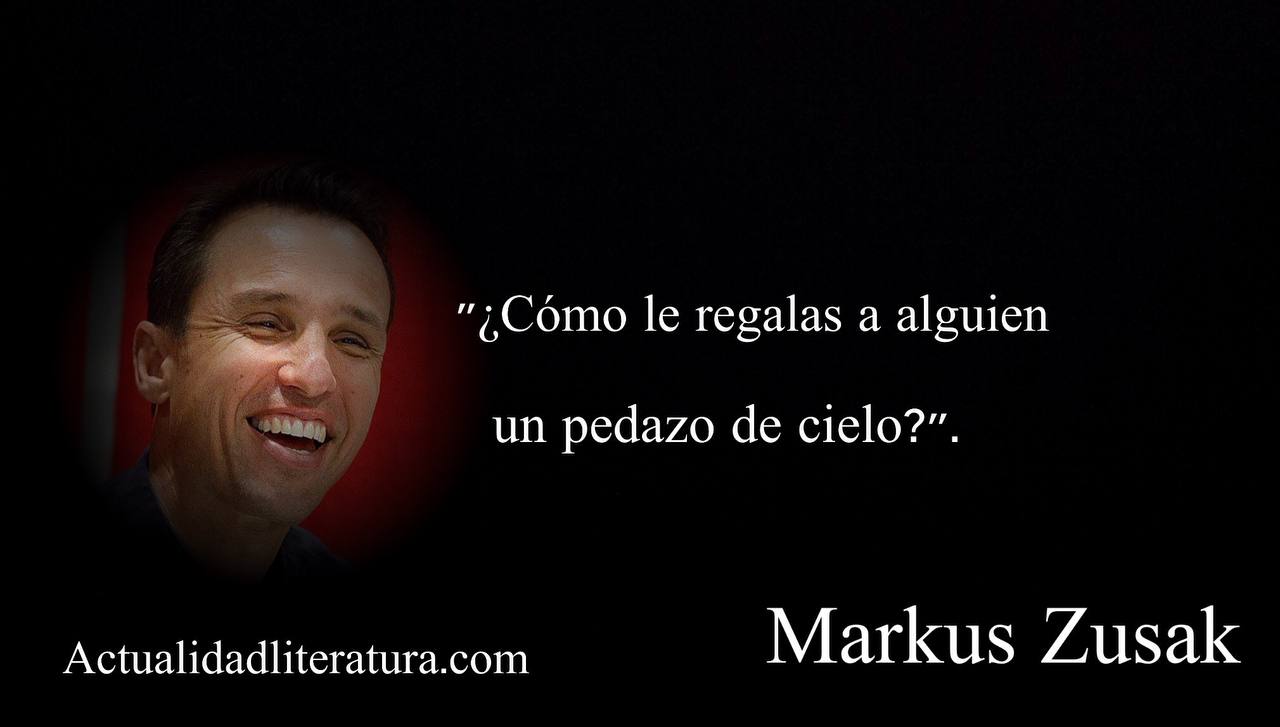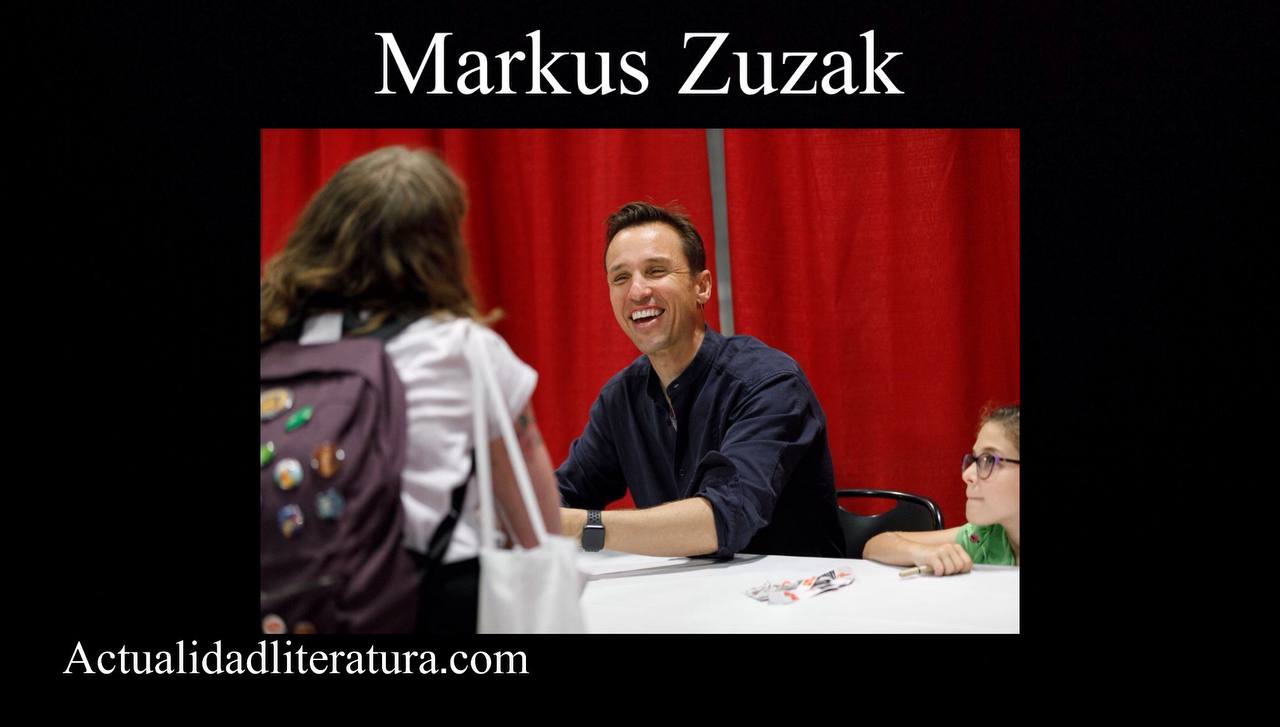
Quote by Markus Zuzak
The book Thief —The Book Thief— is a young adult novel written by Australian author Markus Zusak. This work of historical literature was published in 2005, and its central themes are: World War II, death and Nazi Germany. In 2007 he was awarded the Michael L. Printz Award. Two years later he had the feat of having spent 105 weeks on the best-seller list of the New York Times.
A film based on the novel was filmed in 2013. The tape was directed and written by Brian Percival. Although the film received mostly positive reviews from experts and the public, it has some important script differences from the book's plot. Among these discrepancies are the appearance of the protagonist and the relationship between some of the characters.
Summary of The book Thief
This story is narrated from the perspective of death, who is presented as a character in the play. It all starts in January 1937, when Liesel Meminger, a 10-year-old girl, travels by train with her mother., Paula, and his brother minor, Werner. the trio He heads to Molching, a small town outside of Munich, Germany. The plan consists of going to live with those who will become the adoptive parents of the children: Hans and Rosa Hubermann.
Death, poverty, theft of the first book and ignorance
However, Werner dies on the way due to problems related to the family's poverty. At that time, topics such as hunger, malnutrition, lack of medical attention and cold are discussed. Before reaching her destination, Liesel must attend her brother's funeral. The cemetery is covered by January snow, and it is in this context that the protagonist steals her first book. Its about Gravedigger's Manual.
The problem with this feat committed by the girl is that she can't read. Arriving at the Hubermanns' house, located on Himmel Street, Liesel refuses to go inside. In the end, Hans, her adoptive father, is in charge of convincing her, which generates sympathy between both characters. However, her dealings with her adoptive mother are different.
Rudy's arrival at school and friendship
The girl does not feel sure of her feelings towards Rosa, and the woman seems to be going through the same dilemma. When the protagonist starts school, she again faces her conflict with reading, and suffers as a result. In her new educational institution, the young woman meets Rudy Steiner, who becomes her closest friend, as well as her partner in the theft of food and books.
The breakdown of ignorance: the light of reading and writing
Liesel often has nightmares regarding her brother's death on the train. One night, after one of these events, Hans discovers the Gravedigger's Handbook hidden under the mattress. Inspired by the action of his adoptive daughter, and by his interest in words, the man decides to teach him to read.
From those lessons Liesel learns to write, and so begins to compose letters for Paula. Liesel's missives to her mother are never answered. Finally, the reader learns that Paula is missing.
Living under Nazi rule
Time after, the protagonist understands what it means to live in Nazi Germany when he sees how a book burning is organized. This event is designed to commemorate Adolf Hitler's birthday, which occurs on April 20, 1940. For the protagonist, what she has seen is disturbing and fascinating.
As you watch the flames burn, the protagonist listens to a Nazi spokesman call for the death of the Jewish communists, which causes a change in the girl. The light that goes out in her has to do with her biological father, of whom she only knows her inclinations towards communism. It is at that moment is where he realizes that the leader of the Nazis could be behind the breakup of his family.
The silence necessary to survive
This new conception, coupled with confirmation of her by Hans, causes Hitler to become one of the worst enemies for the protagonist. Her adoptive father urges her to conceal her views, and this conflict leads Liesel to steal her second book, The Man Who Shrugged, which he rescues from a burning campfire.
New friendships
Then Hans visits the widow of a Jew who saved his life, and decides to help his son, Max, who flees from the nazis. Hubermann hides him in her house, which produces a positive change in Rosa, who shows courage and tenderness. The young refugee befriends Liesel.
At par, the protagonist maintains a friendship with Ilsa Hermann, the mayor's wife who offers you their library so you can enjoy reading.
Drastic changes
However, things change when Hans is recruited for offering bread to a Jew, and Alex Steiner, Rudy's father, is forced into the army. Without the presence of Max and Hans, Liesel must get ahead with Rudy and Rosa. However, after several months he sees his father and his friend again, although not in the best condition.
The blank book: own history and tragedy
Later Liesel stops visiting the Herman Library, but Ilsa gives him a blank book. in which the girl begins to write her own story: The book Thief. While the young woman writes in the basement, Himmel street is bombed, and all your loved ones die.
In his despair, the protagonist drops her book, but it is recovered by Death. When she is orphaned again, Ilsa Hermann proposes that she spend some time in her house. Then Alex Steiner returns and Liesel stays with him for a few months. The play concludes when she, after a long life with her husband and her children, Death returns the book to Liesel in exchange for taking her soul.
About the author, Markus Zusak

markus zuzak
Markus Zusak was born in Sydney, Australia, in 1970. He studied at the University of New South Wales, and became a writer for children's and youth literature. The young Zusak grew up listening to the stories of Nazi Germany, as well as the anecdotes of his parents in Austria and Germany. The author wanted to write a book that reflected the mistreatment of the Jews, which inspired him to write the bestseller The book Thief.
In addition to its laureate workMarkus wrote Crossed letters —messenger—(2002), for which he received several awards, such as the Publishers Weekly Best Books of the Year-Children (2003) or the Michael L. Printz Award Honor book (2006). Other lesser known works by Markus Zusak are The Underdog (1999) and Bridge of Clay (2018)
